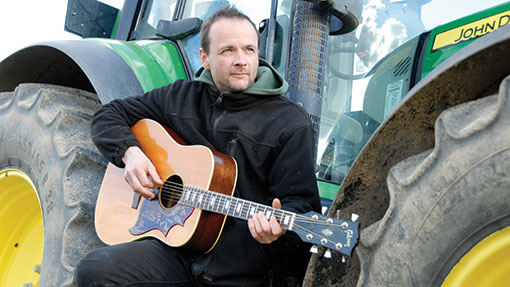Band shows music and farming can go hand-in-hand

The crowd is singing in your ears, the atmosphere is electric. It’s the world’s biggest showcase for a band. So what’s the first thing guitarist Anthony Vicary does when he comes off stage at Glastonbury?
“He only starts discussing lactation averages with Michael Eavis, who was about to hand us a cheque,” recalls fellow band member Tom Williams. “It was the high point of Anthony’s career… meeting the most famous farmer in the world.”
The pair are in the Kent-based group, Tom Williams and the Boat. Their irresistibly catchy harmonies owe a lot to daily milking routines, according to 37-year-old Anthony who, at the time of his star-struck encounter with Glasto founder and fellow dairy farmer Eavis, was juggling managing a 180 cow-herd with recording sessions and gigs. “The best time for thinking up tunes was scraping down after milking because it was so mind-numbingly boring,” he says.
Life has calmed down since Anthony’s family took the decision to close the Mill Farm dairy unit and concentrate on the arable side of the business – although, thankfully, it hasn’t damaged the band’s creativity. Anthony’s answerphone at home is still clogged with half-formed melodies that he hums down the mobile from his tractor cab for fear they’ll slip away before the next pass.
The nu-folk band’s third album, Easy Fantastic, released this summer, could be their most successful yet. They’ve been courted by Cerys Matthews on BBC 6 Music, received a six out of 10 from hard-to-please NME and compared to Frank Turner, the “Billy Bragg of the Facebook generation” with whom they share a passion for nurturing grass roots support over social networks.
All three albums since 2007 have been financed through PledgeMusic, a crowd-funding vehicle for fans, who have consistently over-subscribed, such is their enthusiasm for the band’s storyline lyrics and complex compulsive harmonies.
There was more than enough raised to launch the Boat’s debut Teenage Blood album on their own Wire Boat Recordings label, as well as the follow-ups Too Slow and Easy Fantastic, released in a 50:50 deal struck with London-based Moshi Moshi Records, which allows them to retain control of their destiny… even if they’re not entirely sure what that is.
Tom says: “We must have put out 100 singles in the last seven years and we never once sat down and planned out what we were going to do next.”
Drummer Chris Stewart adds: “The whole thing about the band is it’s DIY. It relies on the participation of audience and fans.”
The implication is that, were they to sign to a big label, the band and its fans might be made to dance to a different, more commercial tune. Instead they continue to plough an independent furrow, arranging tours around harvest at Mill Farm and the commitments of the other members, lead singer Tom, David Trevillion, Josh Taylor and Chris Stewart, and giving their music away for free.
“If they like it, they put it up on YouTube or give it away to their friends,” says Tom. “So from the early days, we built up a mailing list by giving our songs away in exchange for an email address and that gave us enormous power because it meant we could sell direct to people.
“Take this last album. The single that was meant to be the lead didn’t get as much radio play as we hoped, so in a bid to rustle up some enthusiasm we put it out as a free demo EP. That had 2,000 downloads, but with 2,000 email addresses that created 2,000 opportunities for us to sell. Our fanbase are in their mid-20s and 30s. They’ve rediscovered vinyl and CDs and they want it all.”
The track, All Day, has since enjoyed nearly 80,000 hits on You Tube.

The beauty of capturing fans’ details with freebies is that they can direct mail them with details of gigs and invite them to invest in album production. And it’s cheaper for the band to pay back that goodwill investment with signed CDs, copies of Oxford art grad Tom’s limited edition work, free house party gigs, guitar lessons with Anthony, and even beer bottled especially for them by Harvey’s brewery in Lewes, East Sussex, than it is to go out and borrow the cash. More importantly, it also builds brand and band loyalty.
When not writing songs in the front room of Anthony’s farmhouse in Chiddingstone, the band might be found rehearsing and laying down tracks in a hop-drying shed at nearby Larkins Farm, which also served as the backdrop for many of the second album’s videos and promo shots.
“The farmer Bob Dockerty is a family friend,” says Anthony. “He’s an old rock and roller and is fanatical about the Stones.”
Anthony, who’s been playing guitar since he was 15 and continues to compose and sing his own brand of folk with wife, Fiona, found himself at a career crossroads when the crunch came to invest in the dairy unit or get out of milk four years ago. In the end, dad Keith made the choice for him by dispersing the herd and giving him the freedom to concentrate on performing.
During the three years he spent juggling milking and music, he never once missed a gig. As Chris point outs: “I remember him getting kicked by a cow and breaking a rib, but he still played Brighton that night!”
Life on the road, living off tinnies and takeaways, playing gigs to dimly lit crowds in sweaty mosh pits, seems a long way away from a career in the countryside. But for Anthony, who shares the song-writing credits for five of the 11 tracks on the new album, agriculture and music will be forever linked.
“Farming and music go hand-in-hand in a strange kind of way,” he says. “The farm is part of me – it’s fourth generation; the music is something I love. I love these guys, I love being on tour. It’s bizarre but I’ve got used to it.”
